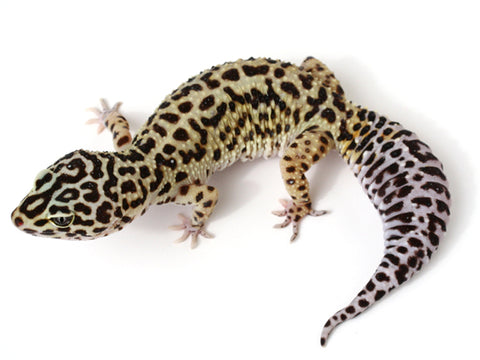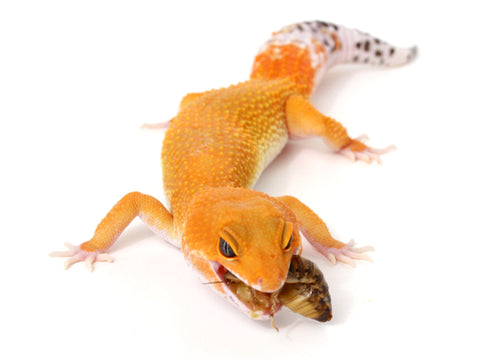Purchasing and Acclimating a New Leopard Gecko
Like many other leopard gecko breeders, at Gecko Daddy we are often asked questions about purchasing and acclimating new geckos. We are happy to respond to emails and calls whether or not the geckos were purchased from us.
Below we will share a few questions that we recommend should be asked before purchasing a new gecko. We will also address some of the most common questions that we are asked by those who have recently purchased a leopard gecko and are in the process of acclimating their new gecko. Of course the questions reflect only a few of the most common, and there are many more that could be asked. So, if your question isn’t answered here, please don’t hesitate to email us at geckodaddy@gmail.com.
Purchasing a New Leopard Gecko
When you are considering purchasing a new gecko, there are a few things you should consider and ask the vendor or pet store before you buy. Here are a few that we recommend:
1. How is the health of the leopard gecko?
Certainly, the health of the leopard gecko is the most important factor when picking out your new pet. Is the leopard gecko active? Does its skin look healthy? Are its eyes clear? Does it have a fat tail? Does it have solid stool? You may want to find out how old the animal is and make sure it is an appropriate size and weight for its age.
2. How well is the leopard gecko eating and what is it feeding on?
One of the greatest indicators of a healthy leopard gecko is whether or not it is a consistent feeder. Ask about the animal’s eating habits. You want to know what it is eating, how much it is eating, and how often it is eating. Will you have access to the same type of foods the gecko has been eating? How much will it cost to feed your animal?
3. What habitat conditions does your leopard gecko require?
You will want to know how your new leopard gecko has been caged. Has it been caged in the proper environment? You want to make sure the gecko has been kept at the proper temperature and humidity for the type of gecko you are purchasing. Many gecko species have specific requirements and you will want to make sure that you understand those requirements and that it has been properly housed before you purchase it.
You will also want to make sure that your set up is correct before you bring a new animal home. If you are new to geckos, study out the requirements for the habitat and make sure you are ready for the responsibility of pet ownership.
4. What is the gender of the leopard gecko?
Make sure you know the gender of your new gecko, especially if you plan on housing your new purchase with another gecko. Having two females together is generally fine, but you don’t want to have two males in the same cage--with most species, this could be disastrous! Also, a male and female housed together will make more geckos. Are you prepared for that? Make sure you have a plan for when the eggs/babies start coming. You will want to consider these things before you bring a new gecko home.
5. Should I purchase a younger or older leopard gecko?
It’s really up to you. Younger geckos are very enjoyable to care for and watch grow; however, they may not be as established as older geckos and can be fragile. You should proceed with caution if you are buying a newly hatched gecko. Also, when purchasing a younger gecko, realize that there are a lot of changes that will be taking place. Young geckos in many species, for instance, change dramatically as they mature (the gecko below shows the evolution from 1 month to 8 months old). When buying an older gecko, you miss out on those fun growing months, but you do get a more established gecko and a better idea of how it will look as an adult.

6. Is it okay to mix species of geckos?
No.
Acclimating a New Gecko
Once you bring a new gecko home, there are some things you should be aware of so that you don’t get worried too fast. Here are a few of the questions we are frequently asked:
1. When should I hold a new leopard gecko?
Try not to hold a new leopard gecko for a week or two. This is really hard to do! But it will allow your new gecko to settle in quicker without causing extra stress. Also when you do hold it, start by holding it in the cage for short periods of time until it gets accustomed to your hand. Then you can begin to take it out of the cage and lengthen the time you hold your gecko.
2. What if the leopard gecko doesn’t eat right away?
One of the first things every new gecko owner wants to do is feed their new pet; however, many new animals don’t eat right away. They are stressed to be in a new environment and to be getting all of the attention a new pet often receives. This stress is amplified if there are other geckos in the same cage. This means your new gecko may not eat and it may even change color or become lethargic. It is not uncommon for even the healthiest of geckos to take several days to eat and maybe even more than a week.
3. How long should I wait until I place a new leopard gecko with my existing colony?
Of course, purchasing your gecko from a reputable vendor will increase your confidence that the animal you receive is healthy. However, if you are planning on putting a new animal with your existing animals, regardless of whether you purchased your new pet from a reputable breeder or reputable pet store, you should sequester the new gecko for several weeks. For the first few weeks you should wash your hands after you hold it and make sure that you do not share hides, water dishes, or food between animals. Once you are confident that your new purchase is healthy you can place it with your existing colony.
4. How can I tell if my new leopard gecko is getting along with my older leopard geckos?
Whenever leopard geckos are housed with other leopard geckos, they experience a certain level of stress. As a new gecko is placed with an existing colony, watch for signs of stress. These signs may include color change (usually darker), bad shedding, runny stool, lethargic behavior, and not feeding. Watch your new gecko to make sure it is getting its share of food and that it is growing at a good rate . Also watch to see that it is not being attacked or attacking any of your other geckos. Most of the time geckos adjust to each other fairly quickly, but being left in a stressful environment for extended periods of time can lead to other illnesses, so monitor the situation closely.
There may be other questions and certainly different answers that work, but these are the ones that have worked for us at Gecko Daddy. Purchasing a new leopard gecko is exciting and worrisome, but if you know what to expect and are prepared for gecko ownership, you will likely have a great experience.






